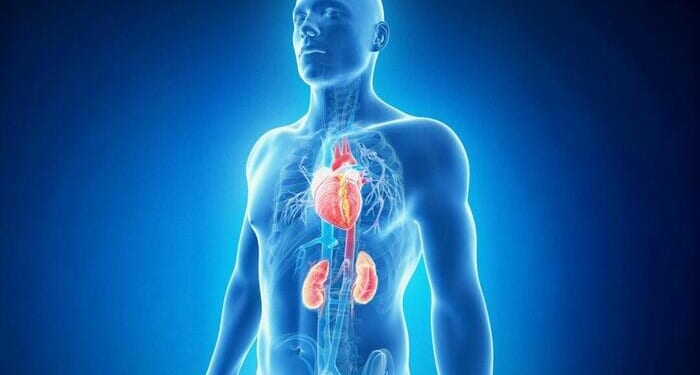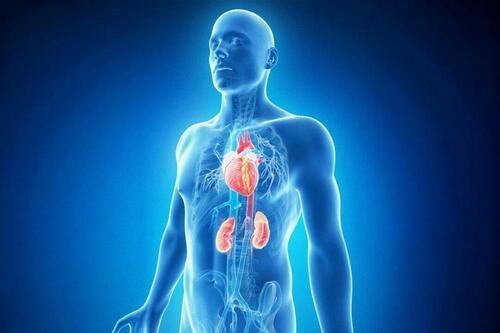Authored by George Citroner via The Epoch Times (emphasis ours),
Nearly every American adult has a health condition that could lead to heart failure, yet nine out of 10 have never even heard of it. Now, the American Heart Association (AHA) is sounding the alarm on cardiovascular-kidney-metabolic (CKM) syndrome, a newly defined cluster of interconnected diseases that doctors have been treating separately for decades.
The condition encompasses a cluster of interconnected conditions—including heart disease, kidney disease, diabetes, and obesity—that often occur together, significantly increasing the risk of heart attack, stroke, and heart failure. It was first defined in a 2023 AHA Presidential Advisory. Despite affecting roughly 90 percent of U.S. adults, few people have heard of it, according to a recent AHA survey.
In early 2026, the AHA will release its first-ever clinical guidelines on the syndrome to help health care providers better identify and treat this widespread condition.
Study Reveals Widespread Prevalence of CKM Syndrome in U.S. Adults
“It’s really common to have risk factors for heart, kidney, and metabolic disease [like diabetes] at the same time, and they’re interconnected,” Dr. Stacey E. Rosen, national volunteer president of the American Heart Association, told The Epoch Times.
The problem, Rosen noted, is that care for people with multiple conditions is often fractured, with various specialists and primary care clinicians working in silos. Through the AHA’s CKM Health Initiative, the association aims to help doctors work together and treat cardiovascular, kidney, and metabolic risk factors together, because that’s how patients experience them, she said.
The Numbers Behind the Problem
A comprehensive analysis of U.S. adults based on data from the National Health and Nutrition Examination Survey spanning 2011 to 2020 showed that nearly 90 percent of adults had signs indicating early stages of CKM syndrome. They carried risk factors such as high blood pressure, obesity, or problems controlling blood sugar.
About 15 percent of adults were classified as having advanced stages, which include having blood vessel damage or kidney disease. Older adults—particularly those aged 65 and older—were most affected, with more than 55 percent classified as having advanced stages.
The study found that the prevalence of CKM syndrome remained steady over the decade, with no significant improvements in reducing the overall burden of disease. Even younger adults aged 20 to 44 showed notable risk, especially among black adults and men, who were more likely to be in higher stages of CKM syndrome.
The condition stems from overweight and obesity in its initial stage and progresses to multiple risk factors and advanced disease, warranting early recognition, Dr. Eugenia Gianos, director of cardiovascular prevention at Northwell Health and director of women’s heart health at Lenox Hill Hospital, told The Epoch Times.
How Heart, Kidney, and Metabolic Systems Are Connected
CKM health involves three critical systems: the heart, kidneys, and metabolic system.
The heart pumps blood to supply oxygen and nutrients; the kidneys filter waste, regulate fluids, and help control blood pressure; and the metabolic system turns food into energy and manages blood glucose levels.
When one system functions poorly, it can create a domino effect, worsening the others. For example, reduced heart function can lower blood flow to the kidneys, impairing their ability to filter waste and regulate blood pressure. Conversely, kidney dysfunction can lead to high blood pressure and fluid overload, which increases strain on the heart.
Additionally, metabolic issues such as high blood sugar and excess weight contribute to inflammation and damage across these systems.
This interconnected cycle can escalate silently, often without obvious symptoms, until significant damage occurs.
Current guidelines emphasize cardiovascular screening beginning at age 40. “Yet the early drift in blood pressure, glucose, and lipids often begins much earlier, especially among young adults with sedentary lifestyles,” Akshaya Bhagavathula, associate professor of epidemiology at North Dakota State University, told The Epoch Times.
While metabolic syndrome has gained attention as a warning stage, he noted, chronic kidney disease can go unnoticed. “Nearly nine in 10 adults with kidney impairment are unaware of it until significant damage has occurred,” Bhagavathula said. The CKM model encourages integrating prevention, screening, and treatment of the metabolic, renal, and cardiovascular systems together, rather than waiting for the disease to declare itself.
Warning Signs You Shouldn’t Ignore
Many people expect heart disease to appear with dramatic chest pain, but early warning signs are far subtler, Bhagavathula said.
Less obvious symptoms include unusual fatigue or weakness that isn’t proportional to activity level and mood changes—such as depression or brain fog—which might also be early indicators. Other symptoms that may indicate trouble include swelling in uncommon areas such as the abdomen or the back of the ankles, which may be caused by fluid retention related to heart or kidney issues.
Something else to watch for is changes in urination patterns, including foamy urine indicating protein loss, dark urine, or decreased urine output, which can be signs of kidney problems.
Toxin buildup from impaired kidney function may cause a metallic taste or bad breath, and difficulty sleeping can stem from fluid overload or breathing difficulties.
Elevated blood pressure that develops gradually without noticeable symptoms is another warning sign.
“Women may present with jaw pain, nausea, or extreme tiredness rather than classic pressure pain,” he added.
“Even small rises in resting heart rate, post-meal glucose, or inflammatory markers predict future cardiac events years in advance,” Bhagavathula said. “These patterns reflect the systemic nature of CKM syndrome; the heart rarely fails in isolation.”
How to Improve Heart and Kidney Health
Most people with CKM syndrome can reverse or slow down the disease process with lifestyle changes and appropriate medications to reduce their risk for heart attack, stroke, or heart failure, Rosen said.
These lifestyle changes include:
- Adopt a Heart-Healthy Diet: Eat plenty of fruits, vegetables, whole grains, lean proteins, and healthy fats, while limiting salt intake to help control blood pressure.
- Stay Physically Active: Aim for at least 150 minutes of moderate exercise weekly to significantly improve overall health.
- Monitor Health Regularly: Track blood pressure, blood sugar, cholesterol, weight, and kidney function through routine checkups to catch potential issues early.
- Avoid Tobacco and Limit Alcohol: Both habits significantly increase risk across all three systems.
- Manage Stress Effectively: Use mindfulness or relaxation techniques and ensure adequate sleep.
- Follow Medical Advice: Take prescribed medications and attend routine checkups.
People should also be cautious with over-the-counter medications such as nonsteroidal anti-inflammatory drugs, which can harm kidney health if used excessively.
The AHA offers educational resources and tools through its CKM Health Initiative website to help people understand these connections and take early action to prevent serious complications such as heart attacks or strokes.
Loading recommendations…

















